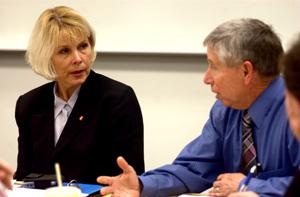The Football Task Force, a committee appointed by Chancellor James Oblinger to review game day tailgating and admittance procedures, met Tuesday afternoon minus two of its three student representatives.
The lone student, Will Quick, a senior in biomedical engineering and political science and student body president hopeful, voiced his opinions on a document drafted following weeks of review of the current football protocols.
The document, under review at the time of the Task Force meeting, highlights the committee’s proposed regulations to tailgating, which include a time cap on arrival and the ban of kegs.
Tom Stafford, vice chancellor for student affairs and member of the Football Task Force, said the decision to review current policies followed administrative and alumni complaints.
“There was a lot of concern from the chancellor’s office and other sources,” Stafford said. “We didn’t come up with [these rules] arbitrarily.”
According to Task Force recommendations, fans with tickets to football games would not be allowed to enter the tailgating area more than four hours prior to kickoff. David Rainer, a committee member and associate vice chancellor for Environmental Health and Public Safety, said the time limit would not greatly affect fans.
“The people arriving [more than four hours before kickoffs] are the people who never make it to the game anyway,” he said.
A noise restriction was also brought to debate. Quick said he wanted to make sure the language inside the document, which includes a “decibel level” limit, was not open to individual delineation.
“Who is going to decide what an appropriate music decibel is going to be?” Quick asked.
Rainer said the determination would be made following adoption of the recommendations.
“It’s going to be pretty subjective, but to put it in perspective it will probably be as loud as a lawn mower,” Rainer said.
According to the League of Hard Hearing the upper spectrum of lawn mower decibel levels is 95, while a rock concert, on average, is just 15 decibels higher, making the proposed restriction technically inconsequential to musically-inclined tailgaters.
Mandatory pat-downs before admittance to games were also proposed by the committee.
Chief of Campus Police Tom Younce said the unobtrusive body searches would not cause delays in entrance times nor require much additional Event One staff, the current workforce at Carter-Finley stadium.
“The pat-downs should only take two to three seconds,” Younce said. “It’s not going to make a big difference.”
Quick called the frisks a “pretty hot topic on campus,” especially among the female population.
“I’ve been able to speak to 20 or so groups in the last two weeks and the one thing that always seems to come up is the pat-downs,” he said. “The girls, more than the guys, are worried about it.”
Security procedural protocol, which is based loosely off that of the National Football League, does call for female-on-female pat-downs.
The committee is still looking into the ban on kegs, debating the definition and conceptualization of the keg itself, but Stafford said the idea was clear.
“I think we all agreed on a ban of any container that holds a large quantity of beer that encourages people to drink and drink,” Stafford said.
The proposals will be revised based on Tuesday’s discussion and will be sent out to members of the committee one last time before being passed on to the chancellor.
“The goal is to implement some of these things by April [in time for the Red and White game],” Rainer said.








